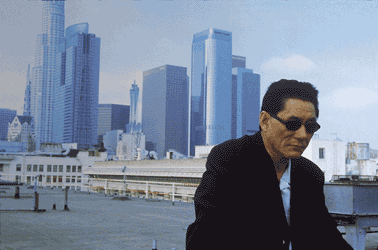L. A. BEAT
In a city characterized as much by feng shui office design as drive-by shootings, perhaps it is not so incongruous to find Takeshi Kitano making his new picture on the streets of Los Angeles. Brother pairs the Japanese art-film superstar with Omar Epps in a tale that finds cross-cultural comedy in the collision between a serenely violent yakuza hitman, his sushi-chef brother and a posse of Angeleno gangsters. Chuck Stephens visits the set.
Takeshi Kitano on the set of Brother.
Photo by Tsuranuku Kumagai.
Takeshi Kitano steps out from behind a video monitor and into the sunlight, his glinting smile slicing through the wet, still wintry breeze that’s been sweeping along this wealthy residential boulevard in the Santa Monica–adjacent Pacific Palisades all morning. An assistant takes the director’s cigarette, helps him into an expensive suit jacket, then steps back as Kitano assumes a position beside a battered rental car with an "I § COPS" bumper sticker. In the background, off-duty L.A. police officers stop traffic, instructions are barked back and forth in English and Japanese, and half a dozen gaffers back out of camera range.
Kitano smiles — more to himself than to the camera — and before anyone can call "action!", plunges an eight-inch dagger directly into his chest.
Only two or three people are paying attention, and one of them is Omar Epps, who slumps in a chair, watching with a smirk while his director and co-star commits this act of goofball seppuku. Epps is nursing a cold this February morning and seems a little reserved, but it’s clear that the African-American rising star and the Japanese actor/director/superphenomenon have, in the course of making Brother, Kitano’s first U.S. co-production, developed a kind of shaggy, all-grins rapport. In the scene they’re shooting now, they’ve faked a car accident to distract a bodyguard who will trot over to take a look at the situation, only to have Kitano plunge that prop-dagger into his kidney. When it’s time for Epps to emote, he starts rolling on the ground and whining like a wounded ninny: "Oh Jesus, the pain, it’s so unfair."
"So far we’ve counted 55 kills on this show," costume supervisor Sandy Ampon tells me when I ask about hassles of mixing stage blood with the film’s designer wardrobes, half from Tokyo’s top-drawer couturist Yohji Yamamoto and half from L.A.’s Daryl Johnson, whose background includes costumes for The Wood and Boyz N the Hood. "But you know," Ampon continues, slightly changing the subject, "this is definitely the friendliest film I think I’ve ever worked on. There’s just so much ... well, cultural communication. We’ve got a cast and crew of Japanese, African-Americans and Italians, and everybody’s working together in a way that’s so unlike the Hollywood films I’m familiar with. On a lot of shows, you’ll find only black people working on black films, and there’s a constant sense of segregation. This is such a refreshing change of pace."
Brother — in which Kitano plays a yakuza hitman who comes to L.A. in search of his sibling, now working in a sushi bar, and becomes enmeshed in a power struggle with black gang members and high-rolling mafioso — is the first co-production between Office Kitano and Recorded Picture Company, which is run by Jeremy Thomas, whose formidable credits include Bernardo Bertolucci’s The Last Emperor and Nagisa Oshima’s Merry Christmas, Mr. Lawrence. L.A.-based co-producer Ann Carli, who worked with Will Smith early during his music career, produced Martin Lawrence’s I Like It Like That, and brought Epps onto Brother, rounds out the team.
"Kitano and I have been planning to work together again for years, but timing’s always been the issue," says Jeremy Thomas, who recently produced Oshima’s much-lauded Gohatto, and first met Kitano nearly 20 years ago. "Our goal on this film has been to create a working environment in L.A. that’s exactly comparable to the way Kitano works in Tokyo. He’s brought his own DP [the estimable Katsumi Yanagishima, who’s photographed all of the director’s films except Hana-bi], his own sound man, even his composer. And his method is pretty consistent: a little bit of improvising, a few quick set-ups, and a lot of perfect first takes."
The plan is for Brother — a return to the unnervingly placid ultraviolence of Kitano’s earlier work, or as Office Kitano’s Head of International Relations Naoyuki Usui describes it, "a sort of Sonatine 2000 — to be released in Japan by Christmas, and by Sony Classics in the U.S. sometime next year. In the meantime, Sony Classics is releasing Kitano’s more or less non-violent kids’ film Kikujiro stateside this May; in it, stylized dream episodes — part Butoh, part schmaltz — depict the realm of childrens’ anxieties and avoid the splattery consequences of gangland hyperreality altogether. Brother, however, has a different and more familiar agenda, one that the director’s longtime fans are sure to recognize, but with a twist. This time, it’s all about bringing people of different races and cultures together, letting them size one another up, get comfortable with one another — and then turning them loose, as only the hilariously sadistic Kitano can do, to blow each other apart.
VOD CALENDAR


 See the VOD Calendar →
See the VOD Calendar →



